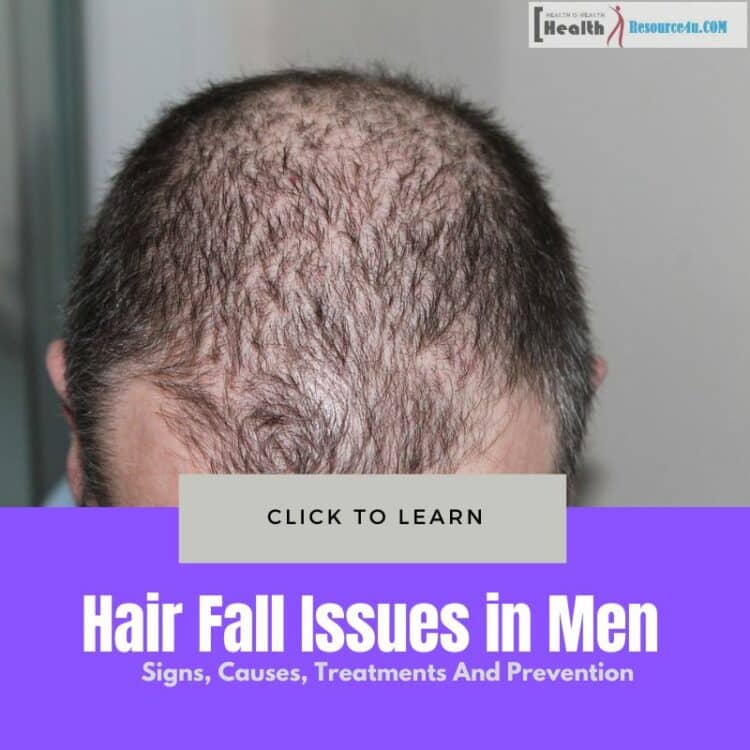Male androgenetic alopecia (MAA) is the most common form of hair loss in men. It affects around 30-50% of men by age 50. It occurs in a highly reproducible pattern, preferentially affecting the temples, vertex and mid-frontal scalp. It is a minor dermatological condition, but can stil impact your self-image. MAA is increasingly identified as a risk factor for arterial stiffness and cardiovascular disease.
In this guide you will learn about the common concerns related to hair loss in men. You will also get valuable insights and actionable information to help you better understand and manage hair fall issues effectively.
Signs of Hair Fall in Men
Table of Contents
Hair fall in men can be identified through various signs that indicate the loss of hair density and overall hair health. Some common signs include:
- Receding Hairline
- Thinning Crown
- Increased Hair Shedding
- Widening Part Line
- Miniaturization of Hair
- Patchy or Circular Bald Spots
It is good to talk to your dermatologist if you find any of the symptoms among you and get help.
Complications Associated with Hair Fall
Hair fall in men can have several complications, both physical and emotional. It is important to be aware of these complications and address them appropriately. Some complications include:
1. Lowered Self-Esteem
Hair fall can significantly impact a man’s self-esteem and confidence. The visible changes in appearance may lead to feelings of self-consciousness and social withdrawal.
2. Increased Stress and Anxiety
Experiencing hair fall can be stressful and anxiety-inducing, especially when it becomes a cause for concern. Stress, in turn, can exacerbate hair fall, creating a vicious cycle.
3. Psychological Distress
Hair fall can cause psychological distress, including feelings of depression and frustration. It is crucial to seek support and professional help if these emotions become overwhelming.
Causes of Hair Fall in Men
Understanding the underlying causes of hair fall in men is crucial for effective management and treatment. Here are some common causes:
1. Androgenetic Alopecia
It is generally defined as male pattern baldness and brings the possibility of hair fall in most cases. It may affect hair health by making the hair follicles thin. Some genetic factors are also responsible for this issue.
2. Hormonal Imbalances
You may lose hair if you develop an excess amount of dihydrotestosterone. This hormone binds to hair follicles, shrinking them and causing thinner hair strands.
3. Scalp Infections
If you suffer from any kind of scalp infection, it may make your hair weak leading to excess hair loss. This infection may show other signs like Itching, redness, and inflammation.
4. Nutritional Deficiencies
Poor nutrition, specifically deficiencies in vitamins and minerals essential for hair health (e.g., iron, biotin, zinc), can contribute to hair fall in men.
5. Physical and Emotional Stress
High levels of psychological and physical stress can cause hair loss. Stress alters the normal cycle of hair growth, increasing shedding and hair loss.
Effective Treatments for Hair Fall
When it comes to treating hair fall in men, several options have shown promising results. These treatments aim to slow down hair loss, promote hair growth, and improve overall hair health. Some effective treatments include:
1. Medications
Medications such as minoxidil and finasteride have been approved by the FDA for the treatment of hair loss in men. Minoxidil helps promote hair growth, while finasteride inhibits the conversion of testosterone to DHT.
2. Hair Transplantation
It is the best solution for your bald scalp. During this procedure, your hair follicles from the sides or back of the scalp are transplanted to the balding areas.
3. Low-Level Laser Therapy
This is a non-invasive procedure that can ensure you regrow your lost hair. It also promotes healthier hair by increasing blood flow to the hair follicles.
4. Platelet-Rich Plasma (PRP) Therapy
PRP therapy involves injecting platelet-rich plasma derived from the patient’s own blood into the scalp. It contains growth factors that can stimulate hair growth and improve hair density.
Home Remedies for Hair Fall
In addition to medical treatments, certain home remedies can complement the efforts to reduce hair fall. These remedies can help nourish the hair, strengthen the follicles, and promote healthy growth. Here are some effective home remedies:
1. Scalp Massage
Massaging your scalp frequently improves blood flow, makes you relax, and keeps your hair follicles healthy. You can use natural oils which include coconut or almond oil to enhance the benefits.
2. Aloe Vera
This is another natural remedy for your hair. This natural gel instantly soothes infections, moisturizes your hair, and reinforces the follicles. Aloe vera also contains vitamins, minerals, and enzymes which can be excellent for your hair’s health.
3. Onion Juice
Onion juice contains sulfur compounds that can stimulate hair growth. Apply onion juice to the scalp and leave it on for 30 minutes before rinsing.
4. Balanced Diet
It may include protein, fruits, vegetables, and healthy fats. All these ingredients are crucial for maintaining optimal hair health.
Conclusion
Hair fall issues in men can be distressing, but with the right knowledge and approach, it is possible to manage and address them effectively. By understanding the signs, causes, and available treatments, you can improve your hair health. Trying out some safe home remedies can help maintain healthy hair and prevent further hair fall. Remember to consult a healthcare professional for personalized advice and guidance tailored to your specific needs.
FAQs
1. Can stress cause hair fall in men?
In men, stress can bring the issue of excess hair fall. It throws off the natural cycle of hair growth, which causes more hair to fall out and shed.
2. Are there any natural remedies for hair fall?
Yes, several natural remedies can complement medical treatments for hair fall. Scalp massage, aloe vera, and onion juice are some examples of effective home remedies.
3. Can diet affect hair fall in men?
A diet rich in essential vitamins and minerals definitely ensures healthy hair. A poor diet may lead to several health issues, including hair loss.

